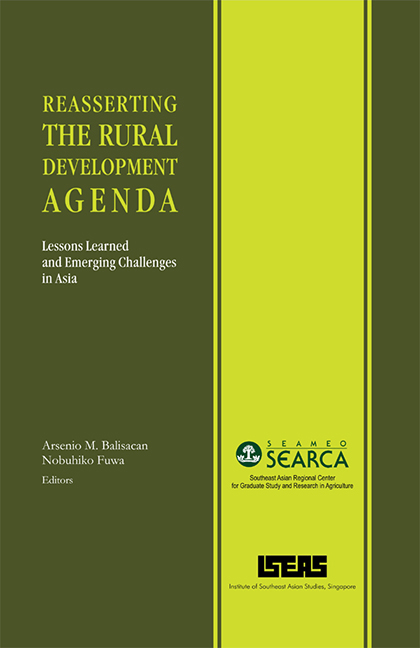Book contents
- Frontmatter
- Contents
- Tables
- Figures
- Preface
- Contributors
- 1 Challenges and Policy Options for Agricultural Development – Overview and Synthesis
- 2 The Economics of Agricultural Development: What Have We Learned?
- 3 The Role of Social Structures and Norms in Agricultural Development: Africa and East Asian Communities Compared
- 4 Food Security in a Globalised Setting
- 5 Poverty and Vulnerability
- 6 Asian Agricultural Development: From the Green Revolution to the Gene Revolution
- 7 Dryland Agriculture in Asia: Ideas, Paradigms, and Policies
- 8 Establishing Efficient Use of Water Resources in Asia
- 9 Improving the Delivery of Extension Services to Rural People: New Perspectives
- 10 Land Tenure and Forest Resource Management in Asia
- 11 Globalisation and the Poverty-Environment Link in Asian Agriculture
- 12 The Supermarket Revolution with Asian Characteristics
- Index
10 - Land Tenure and Forest Resource Management in Asia
Published online by Cambridge University Press: 21 October 2015
- Frontmatter
- Contents
- Tables
- Figures
- Preface
- Contributors
- 1 Challenges and Policy Options for Agricultural Development – Overview and Synthesis
- 2 The Economics of Agricultural Development: What Have We Learned?
- 3 The Role of Social Structures and Norms in Agricultural Development: Africa and East Asian Communities Compared
- 4 Food Security in a Globalised Setting
- 5 Poverty and Vulnerability
- 6 Asian Agricultural Development: From the Green Revolution to the Gene Revolution
- 7 Dryland Agriculture in Asia: Ideas, Paradigms, and Policies
- 8 Establishing Efficient Use of Water Resources in Asia
- 9 Improving the Delivery of Extension Services to Rural People: New Perspectives
- 10 Land Tenure and Forest Resource Management in Asia
- 11 Globalisation and the Poverty-Environment Link in Asian Agriculture
- 12 The Supermarket Revolution with Asian Characteristics
- Index
Summary
INTRODUCTION
Massive degradation of natural resources, including forests, pastureland, and cropland, has been taking place in agriculturally unfavourable or marginal land areas of Asia and other parts of the Third World (Bhattari and Hamming 2001; Cropper and Griffiths 1994; Koop and Tole 1999; Rudel and Roper 1997). The growing rural population has increased the demand for land, trees, and other natural resources; this rise in demand, coupled with tenure insecurity or the absence of clear property rights, is likely to have resulted in the over-exploitation of these natural resources (e.g., Deacon 1994; Bohn and Deacon 2000; Coxhead, this volume). This, in turn, has threatened the sustainable development of agriculture, including the forest and livestock resources. As far as deforestation is concerned, some studies have pointed to the expansion of the cultivation area in hilly or mountainous areas by poor peasants, as its most important immediate cause (Angelsen and Kaimowitz 1999; Rudel and Roper 1997).
In some areas, however, deforestation has been followed by reforestation due to the formation of effective user groups of community forests (e.g., in the hill regions of Nepal) and the establishment of clear individual use rights of forestland (e.g., in northern Vietnam). In other areas, agroforestry, in which commercial trees are intercropped with annual crops when trees are young, has also been developing (e.g., in western Sumatra). The critical question is: Will the broad trend of deforestation continue, resulting in further deforestation and ultimately, in the significant deterioration of human welfare, or are there forces reversing the deterioration trend, thereby conserving or even improving the forest conditions?
It is important to recognise at the outset that people residing in mountainous areas are typically poor, and thus are forced to subsist in the midst of harsh production environments. Therefore, the challenge for us is to find ways to improve both the natural environment and the welfare of the people. For this purpose, it is essential to increase the efficiency of resources use in marginal areas, to a level which makes it possible to raise farmers’ income and, at the same time, to conserve and restore the forest conditions.
The efficiency of natural resource use is governed by land rights institutions which range from communal ownership of land to private ownership, state ownership, and common property (Otsuka and Place 2001).
- Type
- Chapter
- Information
- Reasserting the Rural Development AgendaLessons Learned and Emerging Challenges in Asia, pp. 303 - 334Publisher: ISEAS–Yusof Ishak InstitutePrint publication year: 2007



